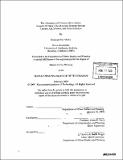| dc.contributor.advisor | Diane E. Davis. | en_US |
| dc.contributor.author | Mullin, Deborah Wei | en_US |
| dc.contributor.other | Massachusetts Institute of Technology. Dept. of Urban Studies and Planning. | en_US |
| dc.coverage.spatial | f------ f-ke--- | en_US |
| dc.date.accessioned | 2009-08-26T17:18:14Z | |
| dc.date.available | 2009-08-26T17:18:14Z | |
| dc.date.copyright | 2009 | en_US |
| dc.date.issued | 2009 | en_US |
| dc.identifier.uri | http://hdl.handle.net/1721.1/46674 | |
| dc.description | Thesis (M.C.P.)--Massachusetts Institute of Technology, Dept. of Urban Studies and Planning, 2009. | en_US |
| dc.description | Includes bibliographical references (p. 94-96). | en_US |
| dc.description.abstract | This thesis examines the differences of Chinese and Western aid implementation and its effects in Africa though the case study of Chinese aid and finance for road development in Kenya. Today, Kenya receives tangible benefits from Chinese aid, firms, and finance in road construction. Chinese aid serves as an alternative to Western donor conditionalities in Kenya helping decrease the requirements of Western funding sources. Western aid, however, may not serve as a "substitute" for Chinese aid, therefore making Chinese aid unresponsive to Kenyan interests. The instantaneous and less bureaucratic nature of Chinese aid and China's personal interest in Kenyan infrastructure lead to an increase in road construction but eliminate Kenya's voice in Chinese aid decision. Furthermore, trainings to Kenyans illustrating a "South to South" relationship are really for building China-Kenya relations and are ineffective for Kenya's human capital development. In addition, this is the first study to outline how the combination of tying of Chinese aid to Chinese firms and China's "Go Out" policy create excessive power for Chinese companies in Kenyan road development and debt financing decisions as well as marginalize Kenya's interests. China's tying of aid and the competitive advantages of Chinese firms working in Kenya crowd out domestic industry and forfeit valuable opportunities to develop local neighboring industries. Kenya needs to treat its relationship with China not just as an aid recipient but as a player in a "mutually beneficial" relationship. In order to receive more responsive and effective aid Kenya must begin to leverage its assets desired by China in order to demand a stronger voice in aid decisions. | en_US |
| dc.description.statementofresponsibility | by Deborah Wei Mullin. | en_US |
| dc.format.extent | 96 p. | en_US |
| dc.language.iso | eng | en_US |
| dc.publisher | Massachusetts Institute of Technology | en_US |
| dc.rights | M.I.T. theses are protected by
copyright. They may be viewed from this source for any purpose, but
reproduction or distribution in any format is prohibited without written
permission. See provided URL for inquiries about permission. | en_US |
| dc.rights.uri | http://dspace.mit.edu/handle/1721.1/7582 | en_US |
| dc.subject | Urban Studies and Planning. | en_US |
| dc.title | The alternative of Chinese aid in Africa : impacts of China's development strategy through Chinese aid, finance, and firms in Kenya | en_US |
| dc.title.alternative | Impacts of China's development strategy through Chinese aid, finance, and firms in Kenya | en_US |
| dc.type | Thesis | en_US |
| dc.description.degree | M.C.P. | en_US |
| dc.contributor.department | Massachusetts Institute of Technology. Department of Urban Studies and Planning | |
| dc.identifier.oclc | 428110289 | en_US |
